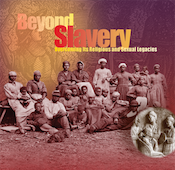Beyond Slavery
Explore the Conference
Explore the Conference by Subject
Slavery in Christian, Jewish, and Muslim Scripture and Religious Law
Christianity, Religion of the Slaveholders and the Enslaved
Sexual Assault and Exploitation Under U.S. Slavery and Jim Crow
How Slavery Has Shaped Our Understandings of Marriage and Friendship
Slavery, Violence, and the State
Beyond Slavery:
Overcoming Its Religious
& Sexual Legacy
Gail Labovitz:
The Purchase of His Money: Slavery and the Ethics of Jewish Marriage
Two types of owned human beings appear regularly in rabbinic literature: the wife and the slave. Thinking of marriage as a purchase and women as ownable allowed rabbis to consider marriage, gender relations, and sexuality in terms of the legalities of property. "Free" wives and slaves were of course not of the same status at the time when this literature developed, but the legal cores of the two transactions-buying a slave and taking a wife-are highly similar. Rabbinical works, dating as far back as the beginning of the third century CE, are the foundation of practices observed by significant segments of Jewish communities to this day. These texts, along with the laws and ideas they expound, often have a vote, if not a veto, in discussions of Jewish ethics and practice. Recognizing the associations between marriage and slavery in rabbinic literature forces us to ask unsettling questions about Jewish traditions, laws, and practices today. Until we confront these questions, and reconfigure Jewish marriage on a model that does not involve metaphors of ownership, slavery will continue to exert its legacy on Jewish women. Many of us may find it easier to accept the authority of these traditions (even as we might subject them to reinterpretation) than to imagine what we might put in their place that would still allow us to feel and act "authentically" Jewish. However, feminist ethics of sexuality and relationship demand of us no less than our best effort.
This video was recorded on October 15-16, 2006 as part of the conference, "Beyond Slavery: Overcoming Its Religious and Sexual Legacy." It was sponsored by the Feminist Sexual Ethics Project in the Near Eastern and Judaic Studies Department at Brandeis University.
